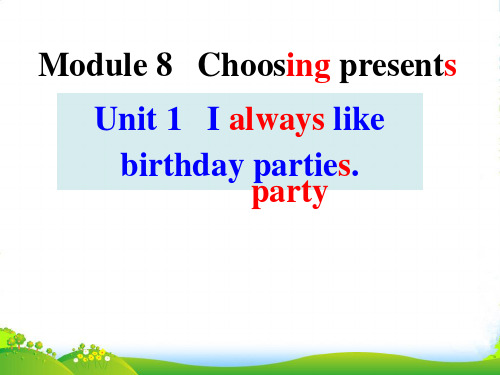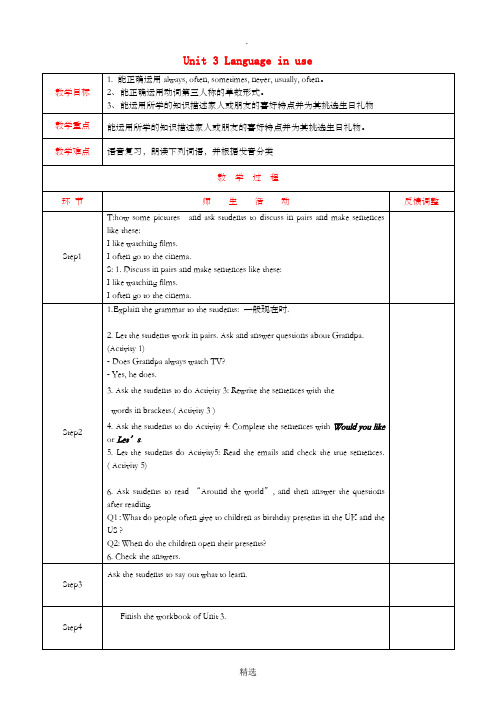七年级英语上册 Module 8 Choosing presents Unit 1 I always like birthday parties导学案外研版
- 格式:doc
- 大小:37.50 KB
- 文档页数:3





Module 8 Choosing presents主题阅读(A)Today is January 20th. It is my birthday. I get up at 7:30 am. My parents say “Happy birthday!” to me.Today I get lots of presents from my parents and my friends. My father gives me a blue box and there is a book in it. My mother gives me a red box and there is a blue skirt in it. Ben, one of my good friends, gives me a big yellow box. There is a basketball in it. I like playing basketball. There is a green note (便条) on my table. It says, “I’m your present, and I’m beh ind your schoolbag.” Aha, it’s a radio! It’s from my brother, Jim.I’m a very happy girl. I love my family and my friends very much.1. My birthday is______.A. January 19thB. January 20thC. January 21thD. January 22th2. ______ gives me a book as a birthday present.A. My fatherB. My motherC. My brotherD. My friend3. Ben gives me ______ as a birthday present.A. a basketballB. a blue skirtC. a radioD. a schoolbag4. The radio is ______ .A. on the bedB. in the boxC. in my schoolbagD. behind my schoolbag5. I get ______ birthday gifts according to the passage.A. twoB. threeC. fourD. five(B)Dear Tony,How are you? Would you like to come to my birthday party? My family, friends and classmates are all coming. The party is on Sunday evening. It starts at half past six. It’s in the Green Hotel. Wehave dinner from half past six to eight o’clock. Then we can go to a concert in th e Central Park. Every Sunday evening, there is a free concert at eight o’clock.I hope (希望) you can come.See you soon!Yours,Wang Hai 根据短文内容,判断正(F)误(F)。

外研社七年级上英语英语《Module 8,Choosing presents》说课稿一. 教材分析外研社七年级上英语《Module 8, Choosing presents》是本模块的第一单元,主题是“选择礼物”。
本课的内容包括如何根据场合和人物选择合适的礼物。
教材通过丰富的情景对话和练习,帮助学生掌握相关词汇和表达方式,提高他们的口语交际能力。
二. 学情分析七年级的学生已经掌握了一些基本的英语语法和词汇,具备一定的口语交际能力。
但他们在实际运用中,尤其在选择礼物这一方面,可能还缺乏相关的文化和语境意识。
因此,在教学过程中,我将会注重培养学生的文化素养和语境意识,提高他们的实际应用能力。
三. 说教学目标1.知识目标:学生能够掌握本课中的相关词汇和表达方式,理解如何根据场合和人物选择礼物。
2.能力目标:学生能够在实际情境中运用所学知识,提高他们的口语交际能力。
3.情感目标:学生能够了解西方的送礼习惯,培养他们的跨文化交际意识。
四. 说教学重难点1.重点:学生能够掌握本课中的相关词汇和表达方式,理解如何根据场合和人物选择礼物。
2.难点:学生能够在实际情境中灵活运用所学知识,提高他们的口语交际能力。
五. 说教学方法与手段1.交际法:通过情景对话,让学生在实际语境中学习并运用所学知识。
2.任务型教学法:通过完成各种任务,激发学生的学习兴趣,提高他们的实践能力。
3.信息技术辅助教学:利用多媒体课件和网络资源,丰富教学手段,提高教学效果。
六. 说教学过程1.导入:通过提问学生喜欢的礼物和送礼物的经历,激发学生的学习兴趣,引入本课主题。
2.新课呈现:通过情景对话,让学生了解如何根据场合和人物选择礼物。
3.操练环节:学生分角色扮演,模仿对话,巩固所学知识。
4.任务型活动:学生分组讨论,根据不同的场合和人物,设计合适的礼物方案。
5.输出环节:学生展示自己的礼物方案,大家共同评价,提高口语交际能力。
6.总结:对本课内容进行总结,强调如何根据场合和人物选择礼物。
Module 8 Choosing presents
Unit 1 I always like birthday parties
【学习目标】
1、本模块重点单词、句型;
2、一般现在时实义动词的第三人称单数形式及其变化规则;
3、频度副词的使用方法。
【课前朗读】
朗读学生学过的单词、短语、句型、课文等。
【课堂活动】
第一步:给目标、给问题——教师“备助”设疑,激情引入
1.make a birthday cake for her/him
2.light some candles
3.send her/him a birthday card/CD
4.give her/him a bunch of flowers (一束花)
5.at my house
6.频率副词是表示与次数, 频率有关的
副词, 其排列是(由大到小):
always (总是), usually (通常),
often (常常), sometimes (有时),
never (从不)。
7. Would you like to come to my birthday party?
I’d love t o.
8.It’s a secret.
第二步:给挑战——“自助、求助、互助”,整合资源,探索技能
一. Words and expressions
二.,Listen and number the words as you hear them.
三.Listen to the dialogue and then choose the best answers.
1.Daming’s birthday is on _______.
A. Sunday
B. Friday
C. Saturday
2. Tony likes _______.
A. cards
B. birthday parties
C. flowers
3. Daming’s mother never makes _____.
A. jiaozi
B. a birthday cake
C. noodles
4. Lingling ______ gets birthday presents.
A. always
B. sometimes
C. never
四. Now check (√) the true sentences.
五.Underline the correct words.
六.Complete the sentences with the words from the box.
七.1. always, usually, often, never
这四个词都是表示频率的副词。
如果用百分数来表示的话,应是:always “总是;一直”,100% ; usually “通常”, 90% ; often “经常”,60% ; never “从不”, 0% 。
它们的位置一般放在be动词、助动词或情态动词之后,行为动词之前。
I usually go to school on foot.
我通常步行上学。
2. —Would you like to come to my birthday party?
—Yes, I’d love to.
—你愿意来参加我的生日聚会吗?
—是的,我愿意。
Would you like…? 常用来向对方提出有礼貌地请求、邀请等,意为“你(们) 想要/ 愿意……吗?”其肯定回答多用Yes, please. / Yes, I’d love to.等, 否定回答多用No, thanks. / I’d like to, but I have to …等。
— Would you like to play football with me now?
—Yes, I’d love to.
3. She never wears jeans or trainers.
她从不穿牛仔裤或软运动鞋。
never是个否定词,用于行为动词之前,构成否定句,否定句中的并列一般用or不用and。
There is no water or food.
没有水和食物。
4. We sometimes give birthday cards.
我们有时候给生日贺卡。
give意为“给,送”,常构成固定短语give sb sth或give sth to sb, 意为“给某人某物”。
Please give the little boy some candy.
Please give the little boy some candy.
5.My mother never makes a birthday cake.
我的妈妈从不做生日蛋糕。
make sb sth表示“给某人制作某物”,相当于make sth for sb。
有类似用法的动词还有buy等。
如:I want to buy my brother a T-shirt. = I want to buy a T-shirt for my brother.
类似用法的词还有:
give sb. sth. = give sth. to sb. “给某人某物”
buy sb. sth. = buy sth. for sb.
“给某人买某物”
第三步:给点评、总结——教师“补助”点评、总结,提升知识与情感。
学生“再助”查漏补缺,复习巩固
一、从方框中选择合适的单词填空。
never, loves, gets, has, often
On Tony’s birthday, he always ___ a birthday party. And he usually ____ some birthday cards from his parents and friends. He ____ gets a cake because he _____ cakes. But he _____ plays computer games.
二、用所给动词的适当形式填空。
1. Jack ___ (have) lunch at his house.
2. What about ________ (choose) this
present?
3. Daming _____ (wear) jeans.
4. He _____ (make) a robot model.
5. After school Tony ____ (do) his homework.
三、按要求完成句子。
1. Tom gives me a present. (改为同义句)
Tom _____ a present __ ___.
2. never, plays, he, games, computer
(连词成句)
____________________________.
3. She does her homework at home.
(改为否定句)
She ______ ___ her homework at home.
4. This Saturday is my birthday.
(就划线部分提问)
_____ __ _ your birthday?
四、根据汉语提示完成句子。
1. 托尼通常收到一张生日贺卡。
Tony ______ ____ a birthday card.
2. 他经常做蛋糕。
He ____ _____ a cake.
3. 他用汉语和英语唱歌。
He ____ the song in Chinese and English.
4. 生日聚会怎样?
_____ _____ a birthday party?
5. 我们从不举办生日聚会。
We _____ ____ a birthday party.
6. 迈克经常在他生日时收到礼物。
Mike often ______ _______ on his birthday.。